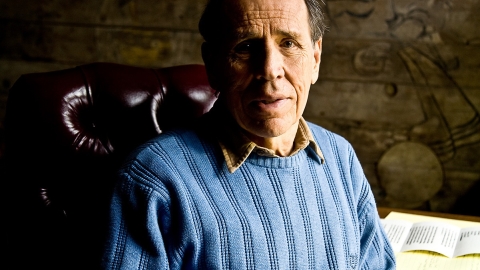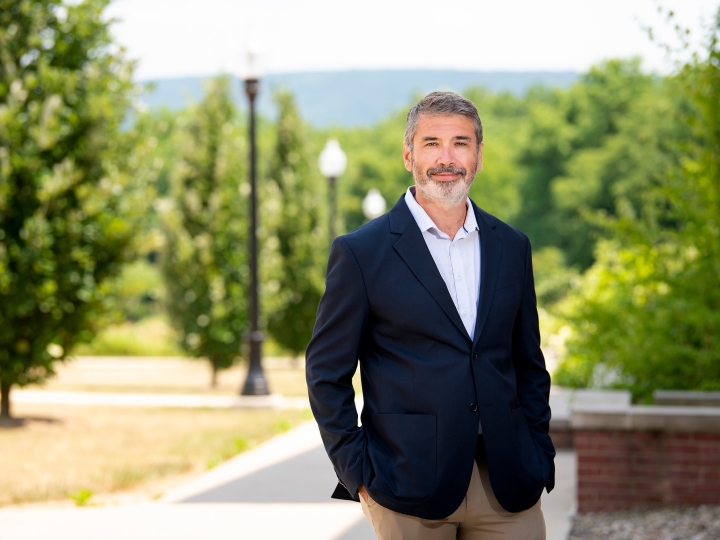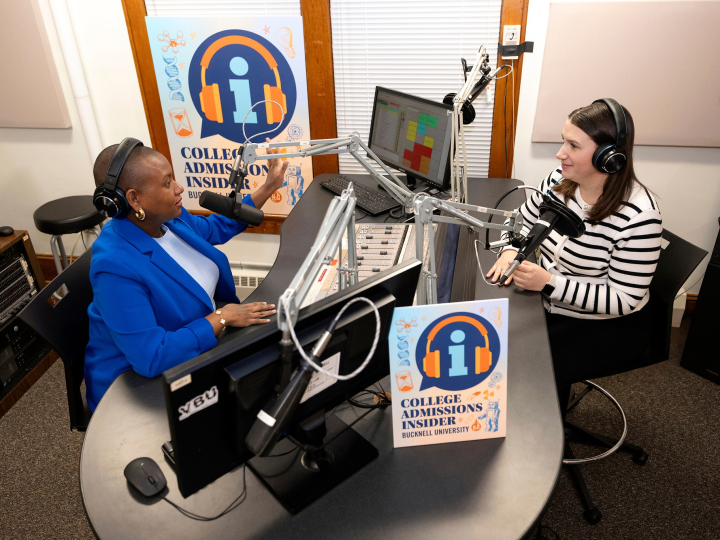
In Memoriam: John “Jack” Wheatcroft '49
April 6, 2017
Photo by Bill Cardoni
John "Jack" Wheatcroft '49, poet, author and professor of English at Bucknell from 1952 to 1996, died March 14 at age 91.
The son of a Baptist pastor, Wheatcroft discovered his love for letters at a young age and began composing Shakespearean sonnets around age 10. He enrolled at Temple University at age 15 thanks to a scholarship for children of clergy.
After two years of studies, he enlisted in the Navy and served on the USS Wisconsin in the Pacific Theater, where he survived kamikaze attacks during the Battle of Okinawa. He would later examine his complex emotions about the war in Answering Fire, a semi-autobiographical novella he published in 2006.
After the war, Wheatcroft enrolled at Bucknell through the GI Bill, majoring in English. He completed his third and final undergraduate year at the University and began teaching even before his graduation, taking over a world literature course after another professor abruptly left Bucknell. He then earned his master's and doctorate from Rutgers University, and officially joined the Bucknell faculty in 1952, choosing Bucknell over Ivy League schools because it would allow him greater freedom to produce his own creative work as well as teach.
Wheatcroft authored 26 books, including poetry, plays and novels, and wrote well into his 80s. His work included the novel Catherine, Her Book, which was chosen as a New York Times Editor's Choice and Notable Book of the Year 1984; the play Ofoti, which was twice adapted for television; and the poetry collections Death of a Clown, The Stare on the Donkey's Face and The Fugitive Self, among others. His work was published in The New York Times, Harper's Bazaar and the New York Herald Tribune, as well as many literary magazines and journals. He also served as a juror for the 1996 Pulitzer Prize for Poetry and was a resident fellow at Yaddo, the MacDowell Colony and the Virginia Center for the Creative Arts.
As a professor, "Jack had a transformative impact on five decades of Bucknell students," recalled former student and close friend Peter Balakian '73, a poet, author and Colgate University professor who won the 2016 Pulitzer Prize for Poetry. "He was a nurturing teacher who taught literature from a deep place in himself. He taught as only a poet and fiction writer could. His eloquence was always probing, always opening up large meanings. He taught students to read language with care and precision and to search for life's deepest meanings and questions in literature and the imagination. There was no one like him."
Wheatcroft received the Lindback Award for Distinguished Teaching in 1964 and was named Presidential Professor at Bucknell in 1972 and Pennsylvania Professor of the Year in 1986.
His teaching frequently extended beyond the classroom. He often hosted students at his historic home overlooking the Susquehanna River in Lewisburg and maintained long connections with many former students.
"I was part of what I would call Jack's lifetime seminar (the credits were priceless)," said former student and friend Matthew Stevenson '76, an essayist and travel writer. "It included visits to the Gundy Farm overlooking the Susquehanna, a stream of long, thoughtful letters from him, lunches at the Algonquin Hotel in New York, copies of his wonderful novels and poems, and conversations about his wartime service off Okinawa or his walk in September 1945 across war-torn Yokohama. It's how I want to remember Bucknell, where in my experience the professors never stop teaching."
Perhaps the most enduring of Wheatcroft's legacies at Bucknell is the Stadler Center for Poetry, which he co-founded in 1985 with Jack Stadler '40. As the center's first director, Wheatcroft combined several existing poetry programs, including a visiting poets series, the literary magazine West Branch and a Poet-in-Residence program he established in 1982. In 1985, he also founded the Bucknell Seminar for Younger Poets, which gathers 12 promising undergraduate poets from Bucknell and other schools for three weeks of intensive study each June.
He also played an instrumental role in founding the Bucknell University Press by introducing, in 1968, his publisher, Thomas Yoseloff, with then-president of Bucknell Charles Watts. The meeting resulted in a plan that enabled the press to become a founding member of Associated University Presses.
Together with Barnard Taylor, Wheatcroft also co-founded the Press of Apple Tree Alley, a boutique publishing house that produced more than 30 fine, hand-typeset and bound editions between 1981 and 2002, including collections of poems by Wheatcroft and others.
"Jack Wheatcroft's presence at Bucknell remains tangible both for senior faculty who knew him well and for newer faculty who live amid his legacy," said Alf Siewers, chair of the Department of English. "His passionate modeling of what it means to be a teacher-writer during his four decades at the English department helped set a standard for Bucknell's modern reputation as a leading liberal arts university."
Wheatcroft's legacy also lives on through the John S. Wheatcroft Scholarship, established by an anonymous donor in 2016 to honor his dedication to the craft of writing.
He was predeceased by his former wife, Joan. Survivors include his wife, Katherine Whaley Wheatcroft M'75, three children and two stepdaughters.

